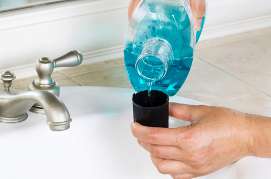Should I use mouthwash?

A mouthwash or therapeutic rinse can complement brushing and flossing, but it's not a license to abandon proven oral health care. Here are a few things to consider before incorporating one into your daily routine.
Simply rinsing helps remove plaque and debris from your teeth. Mouthwash does that, but even rinsing with plain water is good to do after meals and snacks. I recommend rinsing your mouth prior to brushing, as well as rinsing after brushing and flossing.
Mouthwashes fall into two main categories: cosmetic and therapeutic. Some cosmetic rinses contain hydrogen peroxide as an active ingredient and claim to help whiten teeth. (I don't see strong evidence of mouth rinses with hydrogen peroxide significantly whitening one's teeth, which may be due to the limited contact time with the active ingredient.) Other oral rinses claim their ingredients mask bad breath. Of course, masking bad breath doesn't treat the underlying cause.
Sometimes bad breath is caused by food and debris caught between the teeth, but it can also be a result of an infection, decaying teeth or other health conditions. While most mouth rinses are flavored to mask bad breath, they are only a temporary fix. The cause of bad breath should be diagnosed by a health-care professional, who will recommend the appropriate treatment.
Therapeutic rinses, on the other hand, address a specific problem. Of the many types, some may, for instance, add fluoride, while others are meant to reduce plaque and inflammation of the gums that can lead to gum disease. Still others soothe canker sores or a sore mouth. One active ingredient in some of the therapeutic mouthwashes is xylitol, which is known to inhibit the bacteria growth that can lead to tooth decay. Mouthwashes with this ingredient do curb bad breath, but they also help address the underlying cause of decay.
Additionally, some rinses are engineered to act as saliva substitutes, which help people who don't produce enough saliva. People with extreme dry mouth may have to use these rinses multiple times a day.
Many people believe that the flavor or color of a mouthwash contributes to its benefits, but these just make mouthwashes more appealing to the consumer.
Once you have found a mouthwash that meets your needs, it is important to understand that there is no "right" way to use mouthwash. The intended goal of the mouthwash determines how it should be used. For example, if the goal is to expose your teeth to fluoride, then rinsing should last for about one minute, usually before bedtime. If your main goal is to help clean your teeth and other areas of your mouth, then gargling and swishing twice a day is best.
And while mouthwash can be beneficial for both adults and children, remember that it is not a substitute for regular brushing and flossing.




















